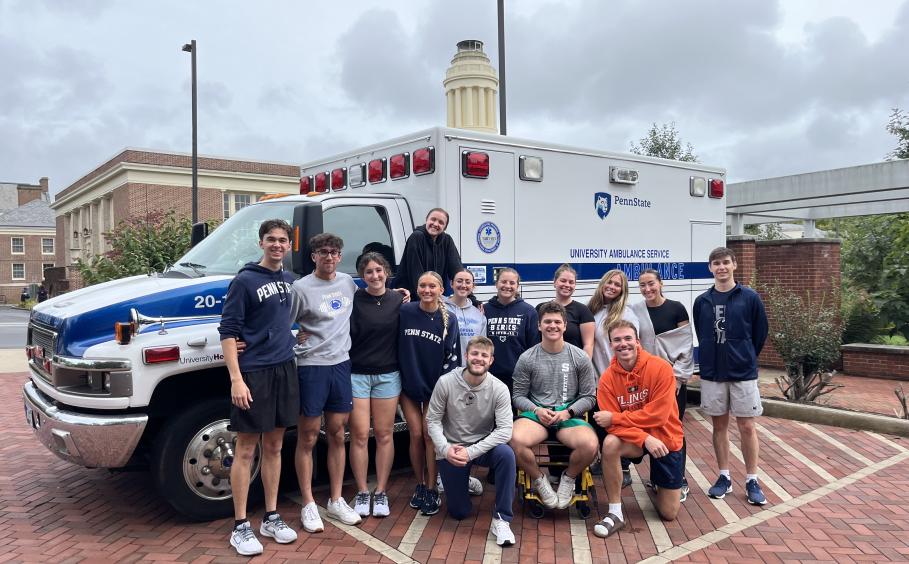-
About
ExploreUp to Main Menu
-
Undergraduate
ExploreUp to Main Menu
-
Getting Started
Explore
-
Future and Current Students
Explore
-
Get Connected
Explore
-
Get Involved
Explore
-
Diversity and Inclusion
Explore
-
Academic Advising
Explore
- Visit and Apply
- Student Profiles
- Donate
-
Getting Started
-
Graduate
ExploreUp to Main Menu
-
Research
ExploreUp to Main Menu
-
Alumni
ExploreUp to Main Menu
-
Get Involved
Explore
-
Achievements
Explore
- Contact
- KINES News
- Donate to KINES
- Update Your Contact Information
-
Get Involved
-
Outreach & Service
Explore
-
Contact
ExploreUp to Main Menu
-
Departments
Explore
-
Research Centers
Explore
-
Central Administration
ExploreUp to Main MenuCentral Administration
-
Training and Support
Explore
- Contacts/Directory
Athletic Training and Sports Medicine

The faculty in Athletic Training and Sports Medicine focus on research that relates to the delivery of clinical health services to physically active individuals including the pathoetiology, prevention, assessment, and treatment of common athletic and orthopaedic injuries.
Program
The Athletic Training Research Laboratory (ATRL) was founded in 1996, and serves as a clinical research unit within the internationally renowned Department of Kinesiology at The Pennsylvania State University, University Park Campus. The ATRL agenda focuses upon investigating the delivery of clinical health services to physically active individuals including the pathoetiology, prevention, assessment, and treatment of athletic, and orthopaedic health conditions. Specific themes of research include: the mechanical and functional instabilities of joints, clinical therapeutic modalities, health-related quality of life outcomes, athletic training education and sports injury epidemiology.
Graduate students become actively involved with research projects under the direction of faculty members. Collaborative arrangements exist with faculty, and clinicians in other areas of the University including the Departments of Orthopaedics and Rehabilitation, Biomedical Engineering and Intercollegiate Athletics. Didactic coursework in athletic training and sports medicine is complemented by courses in biomechanics and locomotion studies, motor control, exercise physiology, and statistics and research design.
Facilities
The Athletic Training Research Laboratory (ATRL) features a broad range of biomedical equipment such as a surface electromyography and electrogoniometry system, a force platform, an isokinetic dynamometer and other relevant clinical assessment tools. A physical exam and treatment area, a functional testing area, and an array of computer equipment are also located in the laboratory. In addition to the ATRL, the Department of Kinesiology houses associated collaborative research facilities such as a Biomechanics Laboratory, Motor Control Laboratory, Exercise and Sports Psychology Laboratory as well as the Noll Physiological Laboratory.
Furthermore, the ATRL is within close proximity to physicians and physical rehabilitation clinics at Penn State Bone and Joint Institute – State College, which facilitates collaborative efforts, and interactions between physicians, therapists, and laboratory personnel in conducting translational sports medicine research.
Specific Information
Graduate program admissions preference is given to applicants credentialed by the Board of Certification (BOC) for the Athletic Trainer or a comparable allied health care discipline with a clinical focus.
Mentors
Learn more about the faculty members who mentor Athletic Training and Sports Medicine graduate students at Penn State:
- Brent Smith, Associate Teaching Professor and Athletic Training Simulation Learning Laboratory Coordinator
- Shinichiro “Shinbo” Sugiura, Assistant Teaching Professor and Athletic Training Clinical Education Coordinator
- John Vairo, Clinical Assistant Professor of Kinesiology



